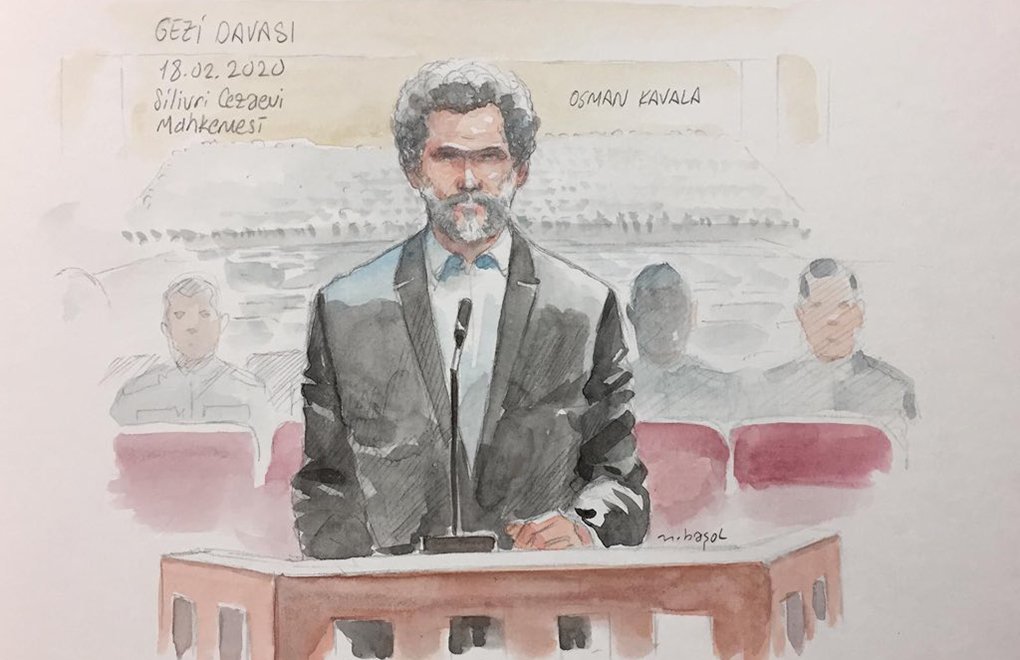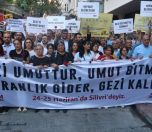* Drawing: Murat Başol
Click to read the article in Turkish / Kurdish
İstanbul Public Prosecutor Edip Şahiner has appealed against the verdict in Gezi trial, where 16 defendants were charged with "attempting to overthrow the government of the Republic of Turkey" and which has ended in a verdict of acquittal dated February 18, 2020.
Objecting to the verdict of the İstanbul 30th Heavy Penal Court, Prosecutor Şahiner has requested that arrested businessperson Osman Kavala be arrested again "as he has a suspicion of escape." He has also demanded that the verdicts of acquittal given for defendants be reversed.
As reported by Kemal Göktaş from Diken news website, in his 90-page petition of appeal submitted to the İstanbul 30th Heavy Penal Court to be referred to the İstanbul Regional Court of Justice, the court of appeal, the Prosecutor has accused Osman Kavala of "giving weight to citizens with Kurdish and Armenian origins in his activities."
Request for re-arrest of Osman Kavala
Prosecutor Şahiner has also argued that the activities of Osman Kavala in the fields of women rights, child abuse, violence against women, assimilation of minorities, freedom of expression and environmental awareness were intended as "attempts to take down the government with mass insurrections."
Within this context, Prosecutor Edip Şahiner has stated, "As a matter of fact, it is known that Osman Kavala gave weight to our citizens with Kurdish and Armenian origins in his activities. "
Referring to the "quality and nature of the charged offense, the available evidence against him as well as the penalty foreseen by the law in the event that the defendant pleads guilty", the Prosecutor has indicated that "arrest is a moderate measure" for Osman Kavala.
Accordingly, "considering the possibility of escape in the event that the offense is proven", the prosecutor has requested Kavala's re-arrest.
'He controlled it behind the scenes'
In his appeal against the verdict, Prosecutor Şahiner has also defined Gezi resistance as an "insurrection" and argued that Gezi resistance was conducted according to a plan and scenario. The Prosecutor has further claimed that Osman Kavala played an active role in planning this process, implementing it and spreading it to the whole country.
In his petition of appeal, Prosecutor Şahiner has also argued that Osman Kavala controlled the process behind the scenes through other defendants, namely Can Atalay, Tayfun Kahraman and Ayşe Mücella Yapıcı.
About Gezi TrialIt has been 78 months since an investigation was launched into Gezi Park protests, 26 months since Osman Kavala was arrested and 19 months since the bill of indictment was shared with the public and the trial started. * Businessperson Osman Kavala, who was on his way back from Antep, was taken into custody at İstanbul Atatürk Airport on October 18, 2017. * On November 1, 2017, it was announced that Kavala was arrested on charges of "attempting to change the Constitutional order and to overthrow the government." In the official document referring him to court with a request of arrest, it was alleged that Kavala was the head and financier of Gezi incidents. * While Kavala and his attorneys were prevented from seeing the file of the investigation with restrictions, the content of the file was served to the media. * On November 16, 2018, a wave of detentions targeted several people, including some executives of Anadolu Kültür Inc. cofounded by Osman Kavala. * The previously acquitted members of Taksim Solidarity platform were also summoned to depose and it was reported in the news that there was indeed a more extensive list of investigation. * Imprisoned for 19 months without standing before the judge and without a bill of indictment prepared by the prosecutor's office, even Kavala and his attorneys also had to follow the course of the investigation from the press. * Almost 1.5 months passed without any judicial processes. * The bill of indictment prepared the prosecutor's office was announced on February 19, 2019 and accepted by the court on March 4. * Issued against Gezi incidents from six years ago in 16 months, the indictment demanded life sentence for 16 people. * The indictment and its annexes were mostly based on wiretapping evidence. It was announced that, mostly consisting of wiretapping evidence, the 657-page indictment also had over 8,000-page additional documents. * The first hearing of the case was held on June 24, 2019. The defendants presented their statements of defense. Yiğit Aksakoğlu, one of the two arrested defendants of the time, was released. * Announcing its ruling on the individual application of Osman Kavala on May 22, 2019, the Constitutional Court concluded that there was "no violation" despite the dissenting opinion of its own rapporteur. * Requests of release for Osman Kavala were rejected in all three hearings on June 24, July 18 and October 9. * Since the Gezi Trial started, the defendants and audience were faced with three different court boards. The presiding judge who requested the release of Osman Kavala was immediately dismissed from his duty. * The European Court of Human Rights (ECtHR) announced its ruling on the individual application of Osman Kavala on December 10, 2019. *Accordingly, the ECtHR has unanimously ruled that there had been a violation of Article 5/1 (right to liberty and security) of the European Convention on Human Rights, and a violation of Article 5/4 (right to a speedy decision on the lawfulness of detention) of the Convention. The Court has said, "By six votes to one, that there had been a violation of Article 18 (limitation on use of restrictions on rights) taken together with Article 5 § 1, and that the respondent State was to take every measure to put an end to the applicant's detention and to secure his immediate release." CLICK - ECtHR: His Pre-Trial Detention Not Based on Reasonable Suspicion Following the ECtHR verdict on Osman Kavala, in the fourth and fifth hearings of Gezi trial on December 24 and January 28, the court ruled for the continuation of his arrest. Prosecutor's opinion added to the file * The opinion as to the accusations of prosecutor Edip Şahiner was added to the file on February 6, 2020. * The prosecutor of the Gezi Trial has requested an aggravated life sentence for three defendants, Osman Kavala, Mücella Yapıcı and Yiğit Aksakoğlu. * The prosecutor has requested 15 to 20 years of prison term for six defendants, who have been charged with "attempting to overthrow the government of the Republic of Turkey or prevent it from performing its duties by using force": Çiğdem Mater Utku, Ali Hakan Altınay, Mine Özerden, Şerafettin Can Atalay, Tayfun Kahraman and Yiğit Ali Ekmekçi. * He requested the separation of the files of the defendants who are abroad: Ayşe Pınar Alabora, Can Dündar, Gökçe Yılmaz, Handan Meltem Arıkan, Hanzade Hikmet Germiyanoğlu, Memet Ali Alabora and İnanç Ekmekçi. The prosecutor alleged that these seven defendants committed the same acts with Kavala, Aksakoğlu and Yapıcı. Verdict of acquittal * The sixth and final hearing of the lawsuit filed into Gezi resistance was held at the İstanbul 30th Heavy Penal Court in Silivri on February 18, 2020. Announcing its ruling after the statements of defendants and their attorneys, the court board has ruled that Osman Kavala, Mücella Yapıcı, Can Atalay, Tayfun Kahraman, Ali Hakan Altınay, Yiğit Aksakoğlu, Yiğit Ali Ekmekçi, Çiğdem Mater Utku and Mine Özerden shall be acquitted as "there was no concrete and material evidence as to the committal of the offenses charged." The court has also ruled that businessperson and rights defender Osman Kavala, the only arrested defendant of the case, shall be released. The files of the defendants who are currently abroad, namely Can Dündar, Mehmet Ali Alabora, Ayşe Pınar Alabora, Gökçe Tüylüoğlu, Handan Meltem Arıkan, Hanzade Hikmet Germiyanoğlu and İnanç Ekmekçi, have been separated from the others and the arrest warrants previously issued against these defendants have been lifted. New warrants have been issued against them so that their depositions can be taken. |
(HA/SD)






as.jpg)

-132.jpg)

-132.jpg)

-132.jpg)

